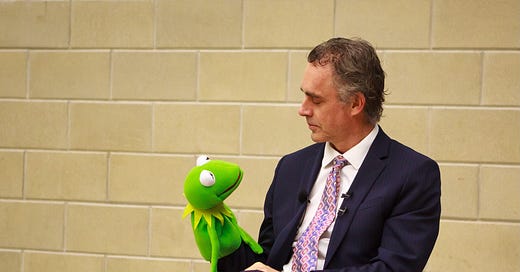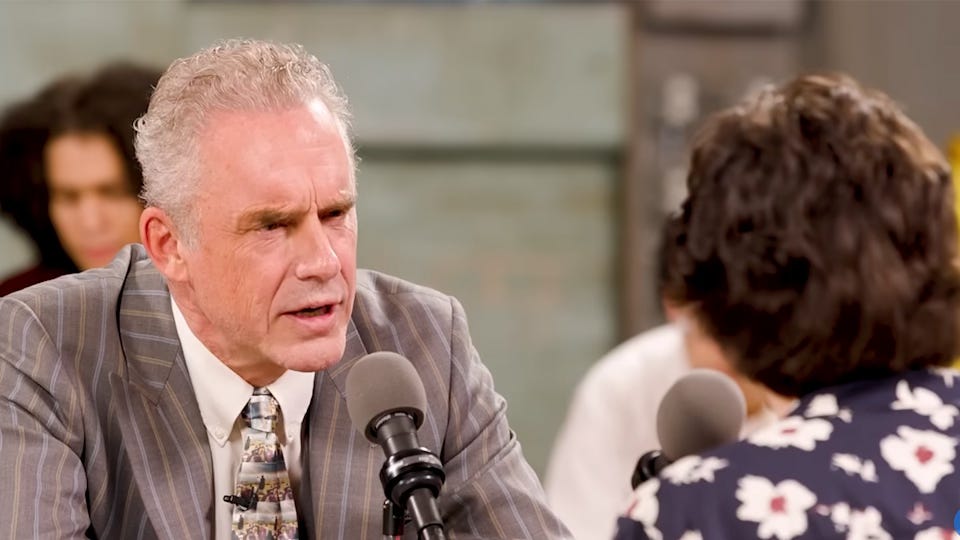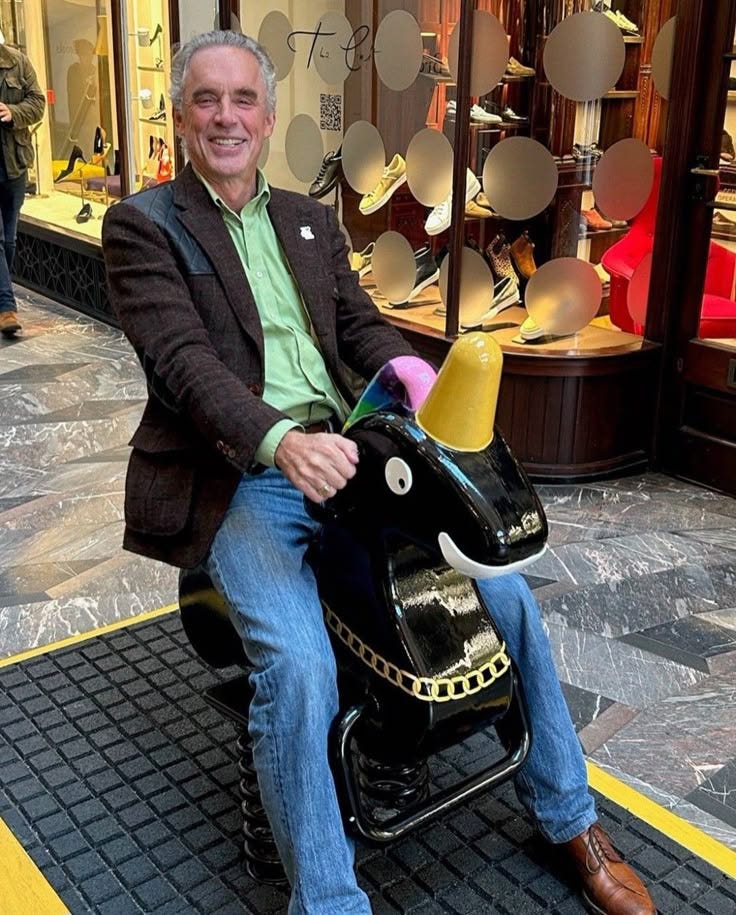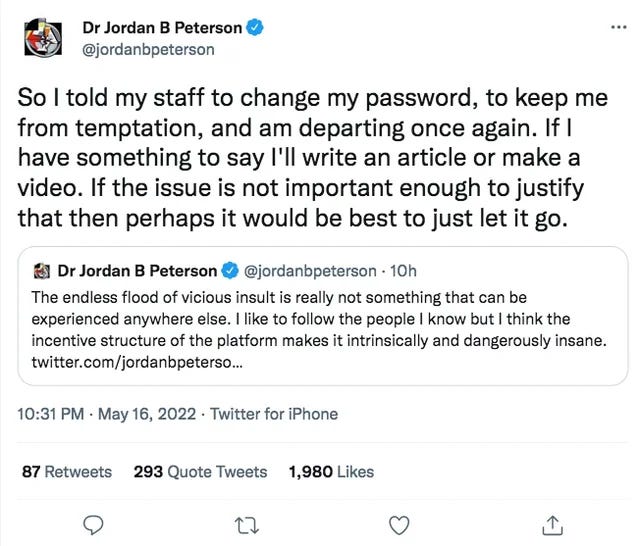Write & Lift is an ethos of personal and spiritual development through conscious physical exertion and practice of the writing craft. Through this effort to strengthen our bodies and minds, we become anti-fragile and self-respecting sovereign individuals. Through this effort, we may stand against untruth and evil and create a new culture of vitality, strength, and virtue
What Happened to Jordan Peterson?
It’s hard watching intellectuals you once respected crash out. It’s never graceful. It’s a screeching and stumbling debacle; gaffes, embarrassing “gotcha” moments, public breakdowns bordering on schizophrenic delusion, hypocrisy and emotional blubbering.
Like many of you, Jordan Peterson helped me out of a very dark time in my life. I was in my mid twenties, working a dead end job, chasing a music career that I knew was neither sustainable nor fulfilling in the long term, and his lectures and speeches lit a fire in me. He was the first, of what would become many, public figures who stood up pre-COVID to the roaring madness of woke thought-crime policing in the late 2010s. He was the first person to show the rest of us that it was ok to call a spade a spade, to say; what the hell, this is actually an insane moral position to take. He was destined to be one of the defining cultural and psychological figures of the next decade. But it didn’t last. It seldom does.
Your favorite bands get older (you realize AC/DC is still putting out records right?). And your favorite filmmakers and writers lose their edge over time. The “sauce” is not guaranteed and it takes a rare personality to sustain any intellectual or creative endeavor long term. The same is true with a majority of public “intellectuals” like Peterson. He has his moment in the sun and now the culture has moved past him. Except he doesn’t get that yet.
This is most apparent in his recent Jubilee “debate,” in which Peterson (an atheist himself, though he has attempted to wiggle his way out of questions that confirm this) takes the stand against twenty young and committed atheists in a roundtable debate over the existence of God. The original title of the video “1 Christian debates 20 Atheists” was changed in less than a day, no doubt, due to the thrashing Peterson recieved at the hands of these sharp, and very online, youngsters.
He sits across the table, shoulders hunched, his voice cracking as he tries to defend the existence of God to twenty-somethings who have ingested enough of Petersons content to know his obvious philosophical blindspots. And they demolish him. Not through superior intellect or devastating arguments, but through the simple act of refusing to be impressed by his theatrical hand-waving and pseudo-intellectual word salads which Peterson has continued to entertain.
This is the same man who, seven years ago, walked onto university campuses like a gunslinger entering a saloon. Clean-shaven, wearing a sharp suit (not the typical Batman villian Riddler suit of today), armed with decades of clinical psychology and a spine made of steel. He faced down screaming mobs of students and professors who wanted to stifle his speech, and he never flinched. His lectures on personal responsibility cut through cultural fog and programming. “Clean up your life before you try to change the world.” Simple. True. Necessary.
So what happened?
The Hollowing Out
Peterson’s fundamental flaw was never his intelligence—it was his unwillingness to plant his flag on solid ground. He cherry-picked from Jung, Nietzsche, the Bible, and evolutionary psychology without ever committing to a coherent worldview. Like a man building a house on sand, he gathered impressive materials but refused to dig down to bedrock. It’s clear in hindsight that Peterson did not galvanize and build an army of supporters by saying anything groundbreaking or new. He articulated what was once common knowledge, that our modern culture had thrown away. Tragedy is woven into the fabric of our existence. If you don’t set your life in order, you’ll be blown through the years without agency or meaning. Free speech is a sacred right. We must commune with our shadow and tap into our darkness in order to understand ourselves and our mission.
At the time, our culture and its associated political tension had degraded to the point where Peterson’s emotional candor and zany oration easily clawed itself into our psyche without much second order thought. Here was a quiet Canadian professor, gesturing wildly, elequently spinning together history, religion, politics, and psychology into something broad and applicable to our daily lives. He was relatable, aspirational, and corageous when few others had the spine to say what we all thought.
Many of Peterson’s vague mantras: “I don’t believe in God, but I act as though he exists,” flew over our heads. We didn’t feel the need to dig into his theology or the undergirding moral and political basis for his claims. We didn’t see his occasional sputtering public fights or online chimp-outs as discrediting. He was, to me anyways, a vehicle for the expression of many truths pulled from many disciplines. And only after many years, and increased intellectual scrutiny, has it become clear that Peterson was never equipped—intellectually or emotionally—to be the face of a new, 21st century, conservativism
Nietzsche himself warned against the intellectual dilettantism that Peterson displays. The philosopher who Peterson quotes endlessly wrote extensively about the danger of becoming a “collector” of ideas rather than a creator of values. Peterson collections include: Christianity's moral structure without Christian faith, Jungian archetypes without Jung's mysticism, Evolutionary psychology without its materialist implications. By leaning on his psycholigical training, Peterson fell victim to the untenable and irreproducible claims of his chosen field. He’s at the top of the popular psychology hierarchy, sure, but that’s not saying much.
This philosophical pick-and-choose approach worked when he was fighting postmodern relativists and goofy blue-haired college kids. Any coherent framework looks solid next to the deconstructionist nonsense that dominated universities in the 2010s. But the moment Peterson faced genuine criticism—not from pink-haired gender studies majors, but from serious thinkers—his intellectual house of cards began to collapse.
What’s His End Game?
Certain thinkers and philosophies grow into themselves over-time and expand. This takes the right conditions, and right people. I can’t help but wonder what Peterson’s “end game” is. What is his thesis? Does he even know anymore?
In reading parts of Peterson’s first book, Maps of Meaning: The Architecture of Belief, I see a disciple of Jung, Camille Paglia, and Joseph Campbell. Someone who has the intellectual capacity and knowledge to tie the symbolic strands of our vast belief systems and mythologies together in a coherant, psychologically grounded coda. This is where Peterson shines; in the abstract, in the belly of the material he works with. 12 Rules for Life was the best and worst thing that happened to his career. The man who once fascinated over symbols and esoteric systems of belief and meaning became the right-wing Malcolm Gladwell; a New York Times bestseller who stepped in as the father figure or parish priest that young men were lacking. It wasn’t a zeitgeist shifting book due to material alone, and had Peterson been a typical metro-sexual lefty intellectual, it would have garnered a few positive reviews and then faded into pop-psychology purgatory. 12 Rules rode Peterson’s coattails. And the steel eyed man who pushed back on BBC “gender pay gap” questioning has been replaced by the neurotic ramblings of a sensitive boomer who can’t handle anonymous criticism.
He was launched into unyielding fame and spotlight as a “personal development” guru and political pundit, while the true foundation of his thought and intellectual interest has always been in the psychology of belief, of which he’s been unable to clearly state his own. Easily glanced over during his rise to fame, Peterson, at his core, is an enlightenment liberal. He has more in common with Bill Clinton than he does with Nick Fuentes. The baby-boomer enlightenment view of a never ending forward march towards progress in a sustainable democratic system, has been Peterson’s largest blindspot. Emotionally invested in his select cohort of “trusted experts,” the philosophy of self-help espoused in his popular books, has increasingly run into contradictions and hypocrisy. Nobody expects Peterson to be perfect, but when a core tenet of your “aim higher” philosophy; “Assume that the person you are listening to might know something you don’t” or “Be precise in your speech” is thrown out for unhinged and emotional rants about “antisemitism” or “COVID denial” it’s discrediting.
The Peterson of the last four years has become a sail in someone elses wind, not the immoveable object and harbinger of irreconciliable truth of his meteoric rise. Part of being a public figure is being attacked for your blindspots, but in his case, you’d think there’d be a modicum of self-awareness.
He still uses the same rhetorical tricks—the dramatic pauses, the watery eyes, the appeals to ancient wisdom—but there's less behind them now. He's become what every intellectual fears becoming: a caricature of his own success.
Peterson’s Legacy
I’m not writing this to attack Peterson. If anything, I want the old him back. My wife and I met him three years ago, shook his hand, and had a pleasant exchange. I’ve seen him speak two times and on both occasions, his lecture was inspiring and thoughtful.
As Peterson himself has said; “when you care about someone, you’ll have the hard conversation.” I don’t expect the man to read this, but if I were to have a long conversation with him, I’d politely share where I think he’s jumped off course.
Get Out From the Boot of The Daily Wire: From a business perspective, Peterson’s move to The Daily Wire has been a disaster. TDW and it’s supreme leader Ben Shapiro are hemmorghing capital and talent, and have locked Peterson in golden handcuffs. As we’ve seen, Peterson’s opinions change quite rapidly (he was encouraging people to get vaccinated when the pandemic broke out before backpeddling years later), he’s in a positiona at the moment where he has to tow a very specific line or risk getting thrown out *cough* Candice Owens and Brett Cooper *cough*.
Start Listening: Peterson’s flagrant and nasty attacks on “anonymous trolls” shows his disconnect from his once core audience of young men. On platforms like X (Twitter) “anons” are only allowed to have “off-limits” conversations because of Elon’s purchase of the platform. Posting for example, “It’s ok to be white and be proud of your ethnic heritage” is a fireable offense in many companies. Peterson doesn’t seem to understand that “anons” are not heartless psychopathic trolls. They are doing what is necessary for them to have a voice in the culture, without fear of persecution.
Stick to What You’re Good At: When Peterson is at his best, is when he’s dissecting complex mythological, religious, and psychological patterns and relating them to our current times. He should not be debating very-online atheists over Gods existence. He should not be interviewing Benjamin Netanyahu, anymore than I should turn this platform into a place where I discuss Major League Baseball and Formula 1 data trends and analytics.
Quit Being A Boomer Online: Peterson shares all the worst qualities with his generation regarding his online social media use. When he turns the faucet on, it’s an overwhelming barage of ad hominem attacks, pathetic quips, and bizarre rants. Perhaps this is a downstream side effect of his previous benzodiazepines addiction, or perhaps it’s his own psychological chemistry working against him. Regardless, he should know better.
Talk to New People: Peterson, when he’s not interrupting, is a decent interviewer who has had conversations with many interesting people. However, over the last few years, Peterson has increasingly devoted his time to speaking in the same neo-con and classical conservative circles. He’d do well to pull from a wider audience and seek to find common ground, rather than attack or disparage. He cannot shift the zeitgeist, but he can learn to better understand the various competing factions on both the right and left.
Thread of Hope
I don’t worship any “public figure,” but I do recongize Peterson as an important symbol of our current moment. As I said, Peterson has been an overwhelmingly positive influence in my life.
When I first started to listen to his lectures, I was working 14 hour days, scraping by on rent each month, and asking myself how the hell I was ever going to be able to start a family, find a career I loved, or marry the right woman. In the beginning of my wife and I’s courtship, I have fond memories of road trips listening to his lectures in silence and then discussing their content over food at a small seaside diner. I know I’m not alone.
In 2025, it feels like a decade happens in a year, and I want Peterson here as a force for good, not as a hollow symbol of emotional dysregulation and bad PR moves. Time will tell.
As always, thanks for reading.
-Joe












You are very astute and fortunate to have found that family and respectable work yield true happiness despite the bumps on the way. That portrays the good perceptions and qualities that you have to prepare you for the challenges yet to come. On the way you will continually find that God does exist and loves you.
Don’t do drugs kids.